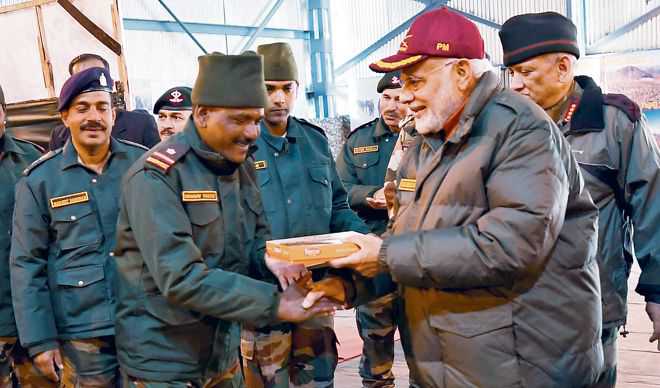
Maj Gen Ashok Mehta (retd)
Defence commentator

By dredging up the INS Viraat issue, PM Modi scored a hat trick in the politicisation of the armed forces. He accused a former PM and victim of terrorism Rajiv Gandhi of using the aircraft carrier as a personal taxi for his vacation with his family and in-laws. This counter-factual assertion has sucked in the Navy which had escaped the Modi web of politicisation — his first and second targets being the Army after the surgical strikes and the IAF after the Balakot airstrikes. He made a similar gaffe in 2017 while campaigning for the Assembly elections in Coorg (Karnataka), when he lashed out at the Congress for having hounded one of Coorg’s military icons, Field Marshal KM Cariappa, when he meant Gen KS Thimayya, also from the same place. This caused embarrassment to the Field Marshal’s son, Air Marshal Nanda Cariappa, and the local veteran community.
Modi’s latest faux pas in advising the IAF to press on with the strikes despite bad weather as it would escape radar detection due to cloud cover takes the cake. When I referred this wisecrack to a serving Air Marshal, he chuckled: ‘The PM needs a military adviser.’ Unfortunately, that General is attached to the National Security Adviser’s (NSA) office. Clearly, Modi’s sixth sense put the IAF under pressure to execute the operation on February 26 and not in better weather as it would have wished to, so that Crystal Maze AGM 142 missiles that video-record the strikes could have been used for ‘proof on a platter’.
In its April issue, a military magazine, Force, carried a smiling Modi in dark glasses wearing a parachute camouflage jacket bearing his name and surrounded by soldiers titled ‘Modi’s Military’. The Modi that later occupied the cover of Time was described ‘Divider in Chief’. In its editorial, Force has reviewed the five-year record of Modi in national security, noting that never before has ‘national security been so integral to pre-election discourse and yet will get limited attention after elections’. It also noted ‘the progressive politicisation of Indian military institutions… which is likely to have far-reaching consequences and would further weaken national security’. By making national security coterminous with terrorism in its manifesto, the BJP has compromised both. In his book, How India Manages its National Security, former Deputy NSA and currently director of BJP think tank, Vivekananda International Foundation, Arvind Gupta says: ‘In recent years, tendencies to politicise actions of the armed forces like the politicisation of the Army’s surgical strikes in Pakistan in 2016 was witnessed and political parties (read BJP) freely used Army’s name in their election campaign ahead of Assembly elections in UP’. This was the progressive politicisation of the military in defiance of the Election Commission’s code of conduct: ‘Political parties/candidate/campaigners must desist from indulging in propaganda involving the activities of defence forces’, a reference to military operations.
In Lucknow, in the run-up to the Assembly elections, I saw on BJP posters, pictures of DGMO Lt Gen Ranbir Singh, the key architect of the strikes, currently Northern Army Commander and contender for the next Army Chief — flanked by Modi and Amit Shah. The strikes were milked all the way to the General Election when Balakot was added. The politicisation of the military, both serving and ex-servicemen, was done brazenly. On April 27, Defence Minister Nirmala Sitharaman inducted seven retired Generals and nearly 100 other personnel into the party’s fold. In his hugely publicised speech to veterans preceding the inauguration of the National War Memorial on the eve of the airstrikes, Modi broke all rules of military etiquette to attack the Congress for the neglect of national security.
The most worrying incident still to be investigated is the Leh poll officer’s letter to GOC 14 Corps Ladakh about complaints by candidates regarding commanding officers of units asking soldiers for their voting preferences rather than just giving them ballot paper. If the traditional apolitical ethos of military is infiltrated by religious and party propaganda, it could break the professional and non-political spine of the forces. Further, the decade-old involvement of two serving officers, Lt Col Purohit and Maj Upadhayay with a religious organisation, Abhinav Bharat, in terrorist cases and the latter reportedly a Lok Sabha candidate for the Hindu Mahasabha party in Ballia is frightening. Still more worrying is the appropriation by Modi of the Army and Air Force as his personal property. Reference to the Army as Modiji ki sena is unacceptable. The PM publicly claimed that ‘Modi ne ghar mein ghuskar mara hai’. It robs the services of their exceptional feats of courage. Former Army Chief and minister, Gen VK Singh (retd) angrily noted that anyone who calls the Army ‘Modiji ki sena’ is a traitor. But in its electoral enthusiasm, the Modi-led election sena has broken all red lines of the code of conduct.
Lt Gen DS Hooda (retd) and Praveen Bakshi of surgical strikes and Doklam fame have expressed concern over military operations being drawn into political discourse and used to win political arguments and elections. The father of Kargil hero Capt Vikram Batra has said: ‘Military operations in Pakistan were right, but politicians should not take credit for them.’ While the three service chiefs have strangely stayed aloof, 500 retired officers petitioned President Kovind over such politicisation.
Winning polls riding piggyback on the military, and at the cost of its politicisation, will have dangerous consequences. If Modi continues as PM, one hopes he will leave the military alone.
